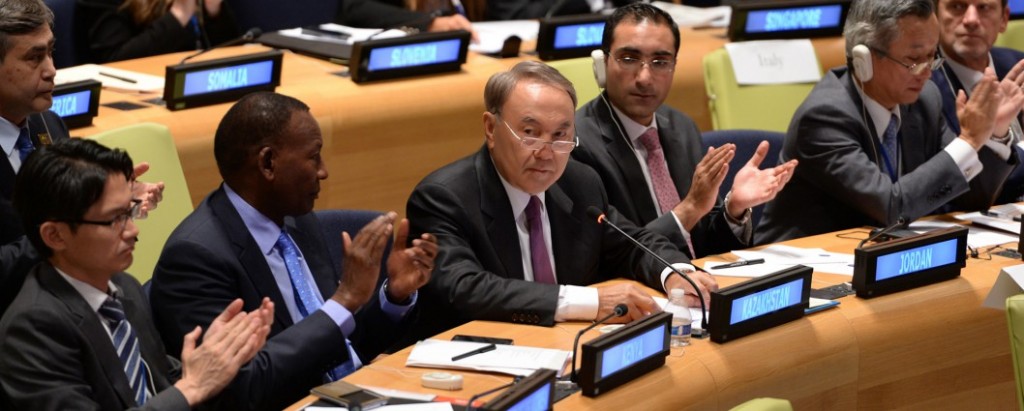NEW YORK – President Nursultan Nazarbayev of Kazakhstan took the floor at the UN Summit for the Adoption of the Post-2015 Development Agenda on Sept. 27, describing his country’s success in implementing the Millennium Development Goals and expressing support for the post-2015 agenda of sustainable development.
 On Sept. 25, world leaders adopted the 2030 Agenda for Sustainable Development, which includes a set of 17 Sustainable Development Goals (SDGs) to end poverty, fight inequality and injustice, and tackle climate change by 2030.
On Sept. 25, world leaders adopted the 2030 Agenda for Sustainable Development, which includes a set of 17 Sustainable Development Goals (SDGs) to end poverty, fight inequality and injustice, and tackle climate change by 2030.
Addressing the audience, the President of Kazakhstan emphasised that his country had achieved significant progress in implementing the previous eight MDG goals.
In particular, Nazarbayev said Kazakhstan had strengthened the foundations of statehood and created the conditions for the development of civil society. He also noted that the country’s gross domestic product had grown by 19 times and the per capita income had reached $13,000 dollars.
Nazarbayev also emphasised Kazakhstan’s positive health indicators: life expectancy in the country has exceeded the age of 71; poverty has decreased by 11 times from 34 percent to 3 percent; infant and maternal mortality rates have fallen by 65 percent; and significant progress has been made in the fight against AIDS, malaria and tuberculosis.
The country is also addressing the health of the planet, he said, by gradually reducing greenhouse gas emissions and taking care of the conservation of its biological diversity.
“We have approved the National Concept of the transition to a green economy. The disappearance of the Aral Sea is a threat not only to our region, but also worldwide. Its drying wind picks up about 75 million tonnes of toxic dust and salts annually, which have already been detected in Europe and Antarctica. With the support of the World Bank, we managed to restore the northern part of the Aral Sea. We are actively cooperating with the UN and the international community in rehabilitating the zone of the former Semipalatinsk nuclear test site. The Central Asian countries are expecting further assistance in order to combat the specific environmental problems of the region,” said Nazarbayev.
The President explained that Kazakhstan supports the global document on the development of the planet and said the final document of this summit would be a truly global guide for development and prosperity in the world.
The goals and targets of the new UN document coincide with the priorities and objectives of Kazakhstan, he said.
“Our response to the current challenges is the Kazakhstan 2050 Strategy, the purpose of which is the country’s entry into the top 30 most developed countries of the world. We are implementing the National Plan: 100 steps on implementing five institutional reforms. It aims to modernise public administration, improve the work of civil and legal institutions and support further industrialisation of the economy. Reviving the economy of the Silk Road at present is very important for the Eurasian continent. This will benefit many countries, reducing transit time from the Asia-Pacific region to Europe. We are paving its infrastructure, building railways and highways linking the Pacific Ocean to Europe and the Middle East,” he said.
In this context, the President stressed the importance of uniting around the idea of Great Eurasia, which would bring together the Eurasian Economic Union, the Economic Zone of the Silk Road and the European Union in a single integration project of the 21st century.
In addition, Nazarbayev touched upon the issue of uneven progress in different parts of the world.
“Negative trends are exacerbated by conflicts in the Middle East, Africa and Asia. The current immigration crisis is caused not only the war but also by the development of imbalances. In the 21st century, successful states will feature no stockpiles of weapons and the ability to generate innovative ideas and create attractive environments. According to the Stockholm International Peace Research Institute, in 2014 the combined military spending of all nations exceeded $1.7 trillion, or about 2.3 percent of world GDP,” he said.
In this regard, the President once again put forward the proposal that each state annually transfer 1 percent of its defence budget to a Special United Nations Fund for sustainable development.
“The best thing we can do is to give hope that humanity will not break on the reef of modern threats and challenges. Kazakhstan is ready to make all efforts and commit all resources to the cause of global development,” Nazarbayev concluded.
The Millennium Development Goals of 2000 set 2015 as the target year. Recognising the success of the goals and that a new development agenda was needed beyond 2015, countries agreed in 2012 at Rio+20, the UN Conference on Sustainable Development, to establish an open working group to develop a set of sustainable development goals for consideration and appropriate action.
In early August 2015, the 193 member states of the United Nations reached consensus on the outcome document of the new agenda, “Transforming Our World: The 2030 Agenda for Sustainable Development.”
The UN summit for the adoption of the new Sustainable Development Agenda with its 17 goals, was held from Sept. 25 to 27, convened as a high-level plenary meeting of the UN General Assembly.
“The impressive success of the achievement of the MDGs (Millennium Development Goals) is by no means a reason for complacency. Addressing global challenges, such as eradicating extreme poverty, combating inequalities, ensuring food security and healthy lifestyles and shifting to more sustainable patterns of production and consumption, will require additional financial, industrial and technological resources, supported by an environment of constructive cooperation and mutual assistance,” said Sergey Lavrov, foreign minister of Russia, in his remarks at the summit.

